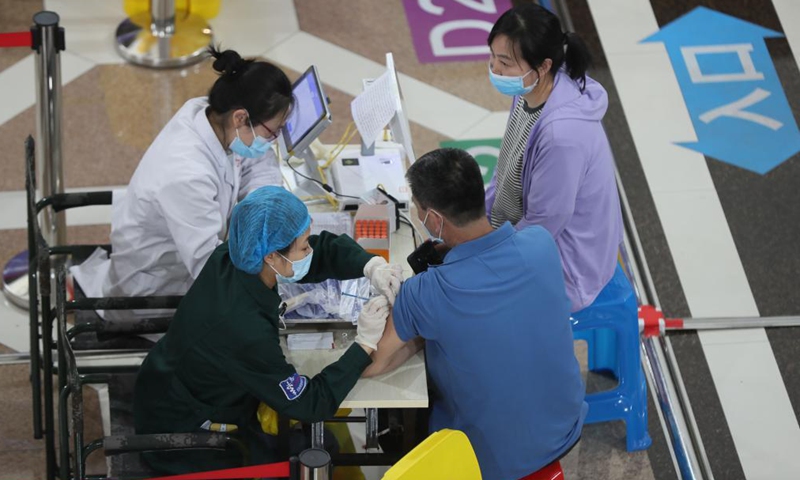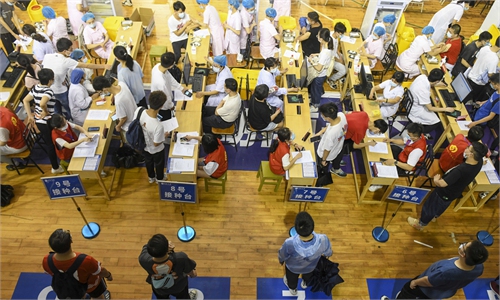
People get vaccinated with COVID-19 vaccines in Dadong District of Shenyang, northeast China's Liaoning Province, May 18, 2021. Photo:Xinhua
China may roll out COVID-19 vaccinations among people aged under 18, as the country still faces mounting pressure from imported cases, according to an official of the Chinese Center for Disease Control and Prevention (CDC).
The information was revealed by Feng Zijian, a deputy director-general of the China CDC and secretary-general of the Chinese Preventive Medicine Association, at a parallel session of the Shanghai Cooperation Organization Forum on People-to-people Friendship held in Wuhan, Central China's Hubei Province, on Wednesday.
China had administered some 700 million doses of COVID-19 vaccines as of press time. Feng said that China had prioritized front line and high-risk groups, including medical workers, at the first stage of the vaccination process. Now, the country is trying to cover people aged 18 to 59, and after those, those above 60 will be covered.
The two inactivated vaccines developed by Sinopharm and Sinovac are now approved for aged people in some regions in China, including Beijing and Shanghai.
After inoculating the over-60 group, the government is considering the vaccination of those under 18, said Feng, who explained that experts are trying to figure out what role young people play in the transmission of the coronavirus, which causes COVID-19.
During flu outbreaks, it was usually the children who passed the virus to other family members. But during the COVID-19 pandemic, teenagers usually were infected by other family members, according to Feng.
The official said that the way to inoculate teenagers would be different from that of the elderly.
"The government is very seriously, actively and cautiously working out the next-stage inoculation plan, policies and services," said Feng.
Feng said that although it has quelled domestic viral transmission, China still faces mounting pressure from imported cases. According to Feng, China has recorded about 10,456 imported cases in total, from 154 countries and regions. The virus was imported to China via contaminated food, by cold-chain workers, transportation and other routes, Feng noted.
Speaking at the parallel session, Yang Xiaoming, chairman of Sinopharm China National Biotec Group, said that since being approved for emergency use in June last year, more than 50 million Sinopharm doses have been administered to high-risk groups, such as medical workers.
Now, Sinopharm has raised its annual production to 3 billion doses, and showed that it can neutralize the B.1.351 and B.1.1.7 variants of the coronavirus, said Yang.
He also said that China took only 25 days to elevate its COVID-19 inoculation total from 100 million doses to 200 million, and five days to go from 500 million doses to 600 million doses.

